Healthcare Professional Portfolio - SCU, Study Period 6
VerifiedAdded on 2022/10/19
|8
|2074
|20
Portfolio
AI Summary
This document is a healthcare professional portfolio, likely submitted for a course at Southern Cross University (SCU). It begins by exploring the student's personal values and beliefs, emphasizing how their upbringing and pre-nursing experiences shaped their approach to patient care, ethical considerations, and professional boundaries. The portfolio then delves into the concept of professional identity, discussing the influence of public image and self-concept on a nurse's career trajectory and credibility. The student articulates their professional philosophy, highlighting the importance of patient advocacy, ethical conduct, and collaboration within the healthcare environment. They reflect on the role of personal beliefs, compassion, and empathy as foundational elements of their nursing career, and the importance of continuous self-improvement, including the value of personal and professional challenges. The portfolio references several academic sources to support the student's arguments. The assignment aligns with the learning objectives of understanding ePortfolios, their purpose, characteristics, and professional advantages, as well as understanding the role of ePortfolios in ongoing professional development and competency across healthcare disciplines.
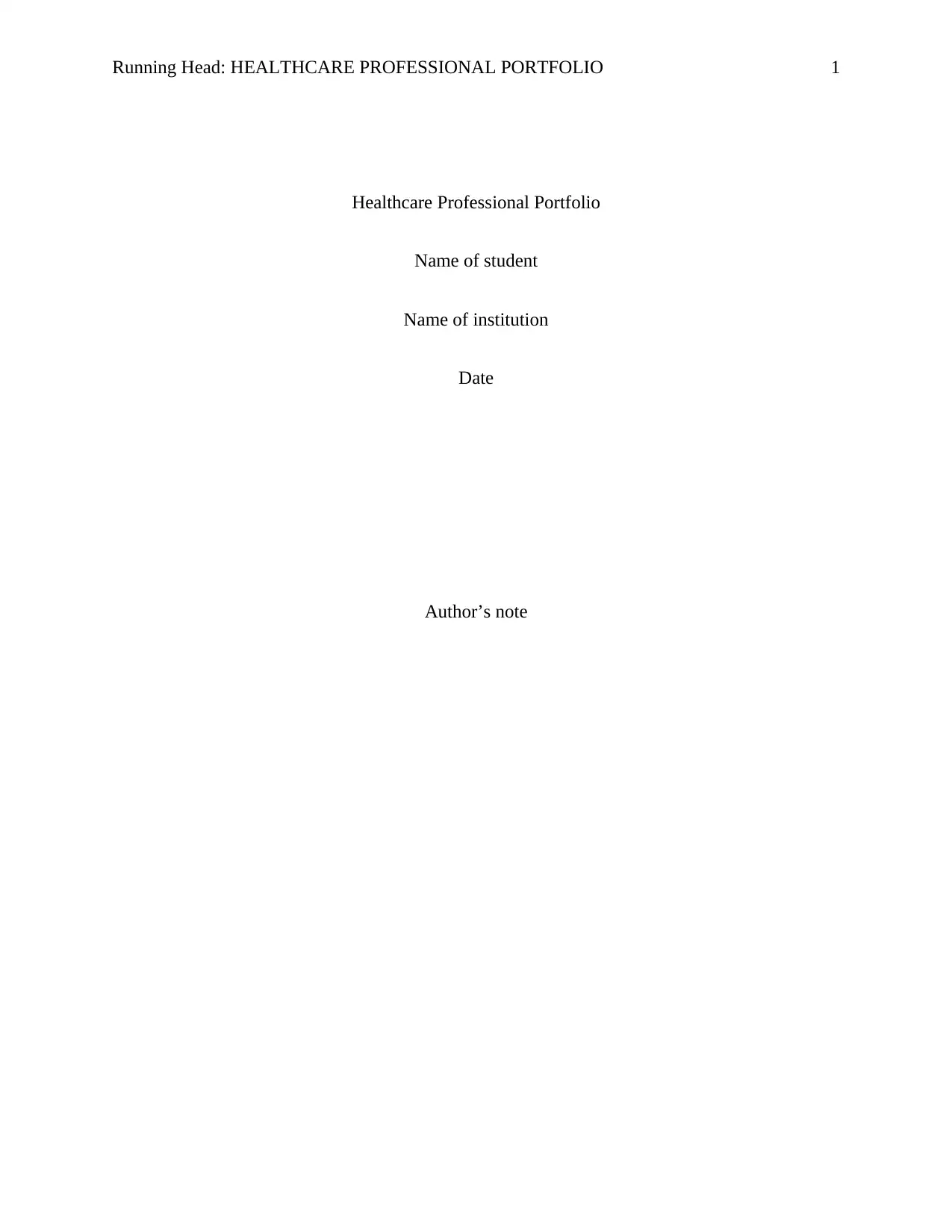
Running Head: HEALTHCARE PROFESSIONAL PORTFOLIO 1
Healthcare Professional Portfolio
Name of student
Name of institution
Date
Author’s note
Healthcare Professional Portfolio
Name of student
Name of institution
Date
Author’s note
Paraphrase This Document
Need a fresh take? Get an instant paraphrase of this document with our AI Paraphraser
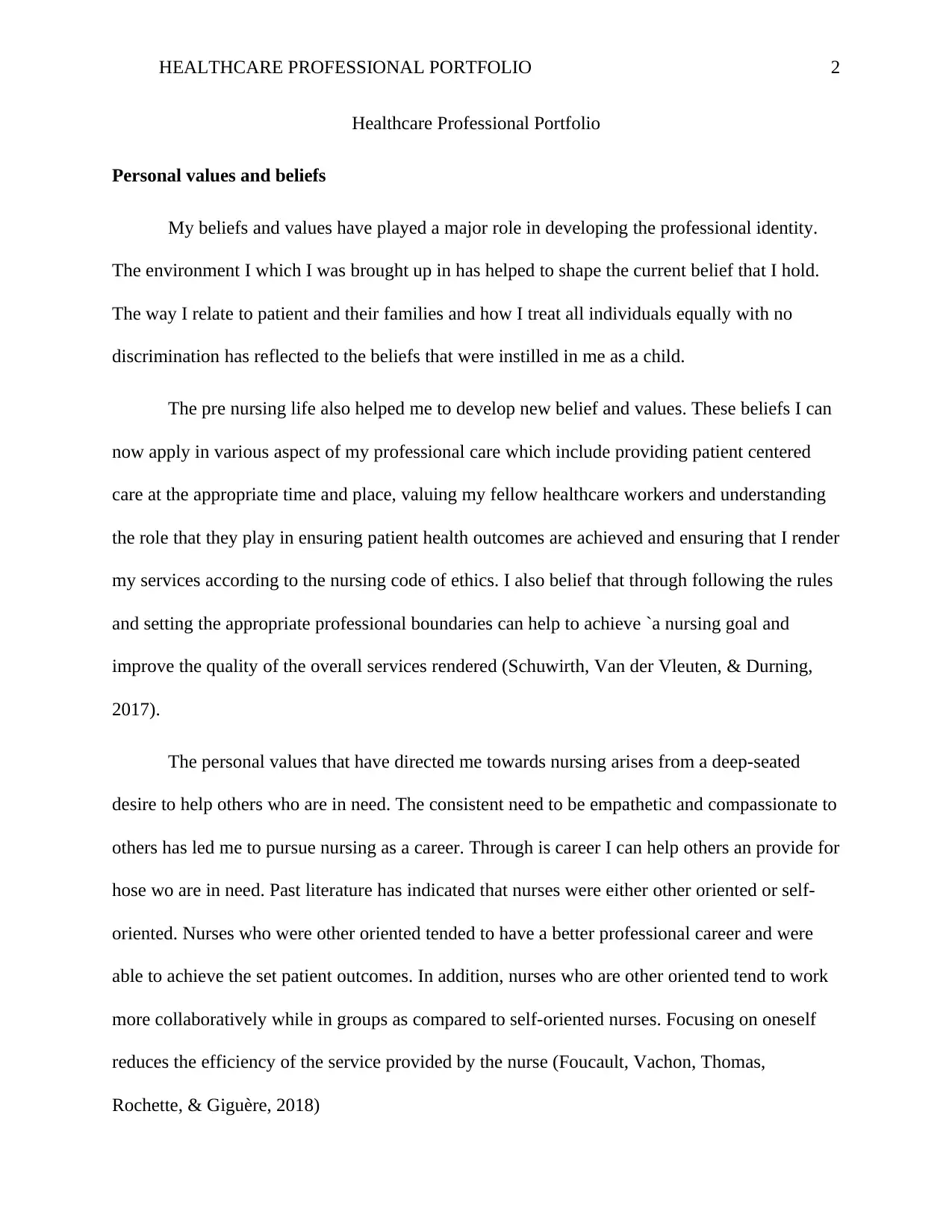
HEALTHCARE PROFESSIONAL PORTFOLIO 2
Healthcare Professional Portfolio
Personal values and beliefs
My beliefs and values have played a major role in developing the professional identity.
The environment I which I was brought up in has helped to shape the current belief that I hold.
The way I relate to patient and their families and how I treat all individuals equally with no
discrimination has reflected to the beliefs that were instilled in me as a child.
The pre nursing life also helped me to develop new belief and values. These beliefs I can
now apply in various aspect of my professional care which include providing patient centered
care at the appropriate time and place, valuing my fellow healthcare workers and understanding
the role that they play in ensuring patient health outcomes are achieved and ensuring that I render
my services according to the nursing code of ethics. I also belief that through following the rules
and setting the appropriate professional boundaries can help to achieve `a nursing goal and
improve the quality of the overall services rendered (Schuwirth, Van der Vleuten, & Durning,
2017).
The personal values that have directed me towards nursing arises from a deep-seated
desire to help others who are in need. The consistent need to be empathetic and compassionate to
others has led me to pursue nursing as a career. Through is career I can help others an provide for
hose wo are in need. Past literature has indicated that nurses were either other oriented or self-
oriented. Nurses who were other oriented tended to have a better professional career and were
able to achieve the set patient outcomes. In addition, nurses who are other oriented tend to work
more collaboratively while in groups as compared to self-oriented nurses. Focusing on oneself
reduces the efficiency of the service provided by the nurse (Foucault, Vachon, Thomas,
Rochette, & Giguère, 2018)
Healthcare Professional Portfolio
Personal values and beliefs
My beliefs and values have played a major role in developing the professional identity.
The environment I which I was brought up in has helped to shape the current belief that I hold.
The way I relate to patient and their families and how I treat all individuals equally with no
discrimination has reflected to the beliefs that were instilled in me as a child.
The pre nursing life also helped me to develop new belief and values. These beliefs I can
now apply in various aspect of my professional care which include providing patient centered
care at the appropriate time and place, valuing my fellow healthcare workers and understanding
the role that they play in ensuring patient health outcomes are achieved and ensuring that I render
my services according to the nursing code of ethics. I also belief that through following the rules
and setting the appropriate professional boundaries can help to achieve `a nursing goal and
improve the quality of the overall services rendered (Schuwirth, Van der Vleuten, & Durning,
2017).
The personal values that have directed me towards nursing arises from a deep-seated
desire to help others who are in need. The consistent need to be empathetic and compassionate to
others has led me to pursue nursing as a career. Through is career I can help others an provide for
hose wo are in need. Past literature has indicated that nurses were either other oriented or self-
oriented. Nurses who were other oriented tended to have a better professional career and were
able to achieve the set patient outcomes. In addition, nurses who are other oriented tend to work
more collaboratively while in groups as compared to self-oriented nurses. Focusing on oneself
reduces the efficiency of the service provided by the nurse (Foucault, Vachon, Thomas,
Rochette, & Giguère, 2018)
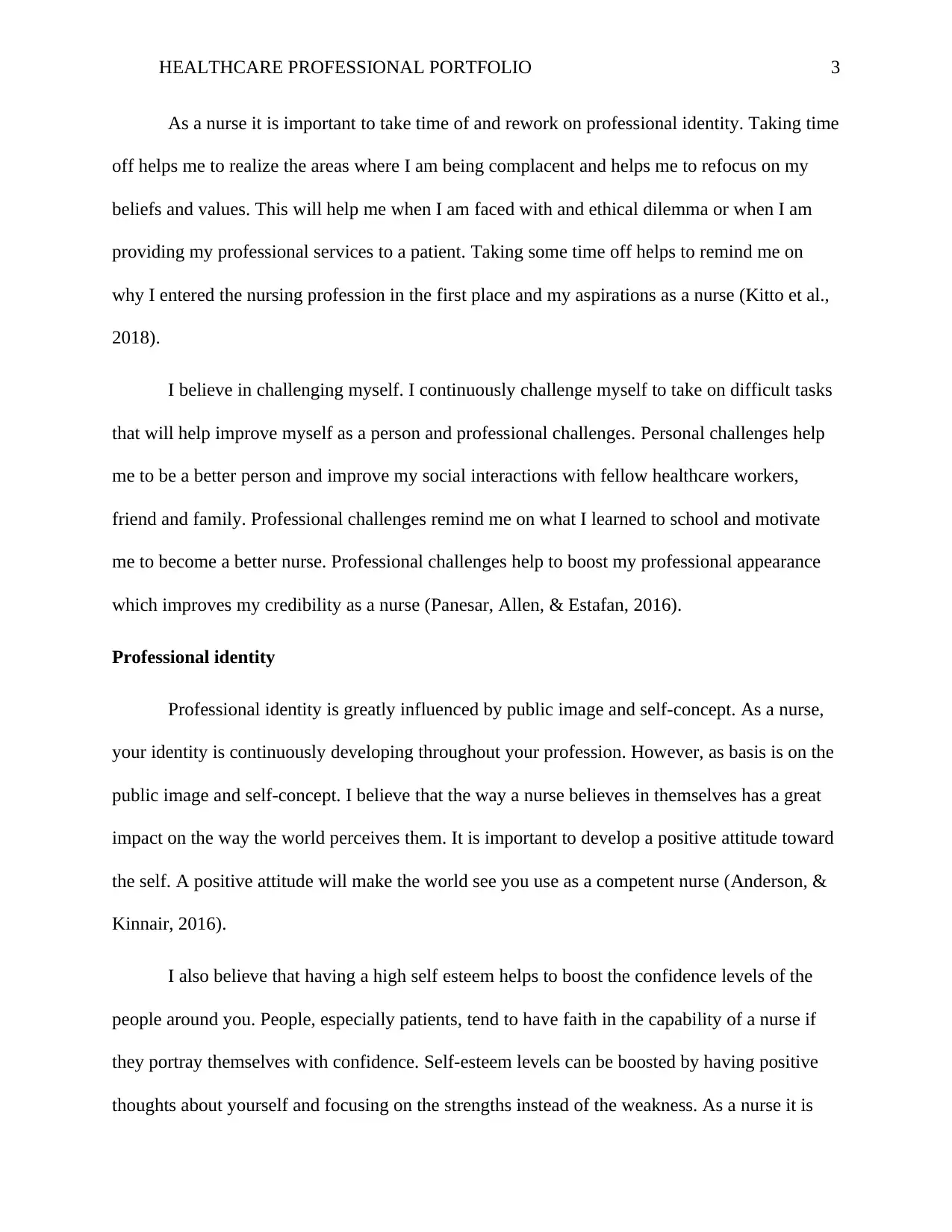
HEALTHCARE PROFESSIONAL PORTFOLIO 3
As a nurse it is important to take time of and rework on professional identity. Taking time
off helps me to realize the areas where I am being complacent and helps me to refocus on my
beliefs and values. This will help me when I am faced with and ethical dilemma or when I am
providing my professional services to a patient. Taking some time off helps to remind me on
why I entered the nursing profession in the first place and my aspirations as a nurse (Kitto et al.,
2018).
I believe in challenging myself. I continuously challenge myself to take on difficult tasks
that will help improve myself as a person and professional challenges. Personal challenges help
me to be a better person and improve my social interactions with fellow healthcare workers,
friend and family. Professional challenges remind me on what I learned to school and motivate
me to become a better nurse. Professional challenges help to boost my professional appearance
which improves my credibility as a nurse (Panesar, Allen, & Estafan, 2016).
Professional identity
Professional identity is greatly influenced by public image and self-concept. As a nurse,
your identity is continuously developing throughout your profession. However, as basis is on the
public image and self-concept. I believe that the way a nurse believes in themselves has a great
impact on the way the world perceives them. It is important to develop a positive attitude toward
the self. A positive attitude will make the world see you use as a competent nurse (Anderson, &
Kinnair, 2016).
I also believe that having a high self esteem helps to boost the confidence levels of the
people around you. People, especially patients, tend to have faith in the capability of a nurse if
they portray themselves with confidence. Self-esteem levels can be boosted by having positive
thoughts about yourself and focusing on the strengths instead of the weakness. As a nurse it is
As a nurse it is important to take time of and rework on professional identity. Taking time
off helps me to realize the areas where I am being complacent and helps me to refocus on my
beliefs and values. This will help me when I am faced with and ethical dilemma or when I am
providing my professional services to a patient. Taking some time off helps to remind me on
why I entered the nursing profession in the first place and my aspirations as a nurse (Kitto et al.,
2018).
I believe in challenging myself. I continuously challenge myself to take on difficult tasks
that will help improve myself as a person and professional challenges. Personal challenges help
me to be a better person and improve my social interactions with fellow healthcare workers,
friend and family. Professional challenges remind me on what I learned to school and motivate
me to become a better nurse. Professional challenges help to boost my professional appearance
which improves my credibility as a nurse (Panesar, Allen, & Estafan, 2016).
Professional identity
Professional identity is greatly influenced by public image and self-concept. As a nurse,
your identity is continuously developing throughout your profession. However, as basis is on the
public image and self-concept. I believe that the way a nurse believes in themselves has a great
impact on the way the world perceives them. It is important to develop a positive attitude toward
the self. A positive attitude will make the world see you use as a competent nurse (Anderson, &
Kinnair, 2016).
I also believe that having a high self esteem helps to boost the confidence levels of the
people around you. People, especially patients, tend to have faith in the capability of a nurse if
they portray themselves with confidence. Self-esteem levels can be boosted by having positive
thoughts about yourself and focusing on the strengths instead of the weakness. As a nurse it is
⊘ This is a preview!⊘
Do you want full access?
Subscribe today to unlock all pages.

Trusted by 1+ million students worldwide
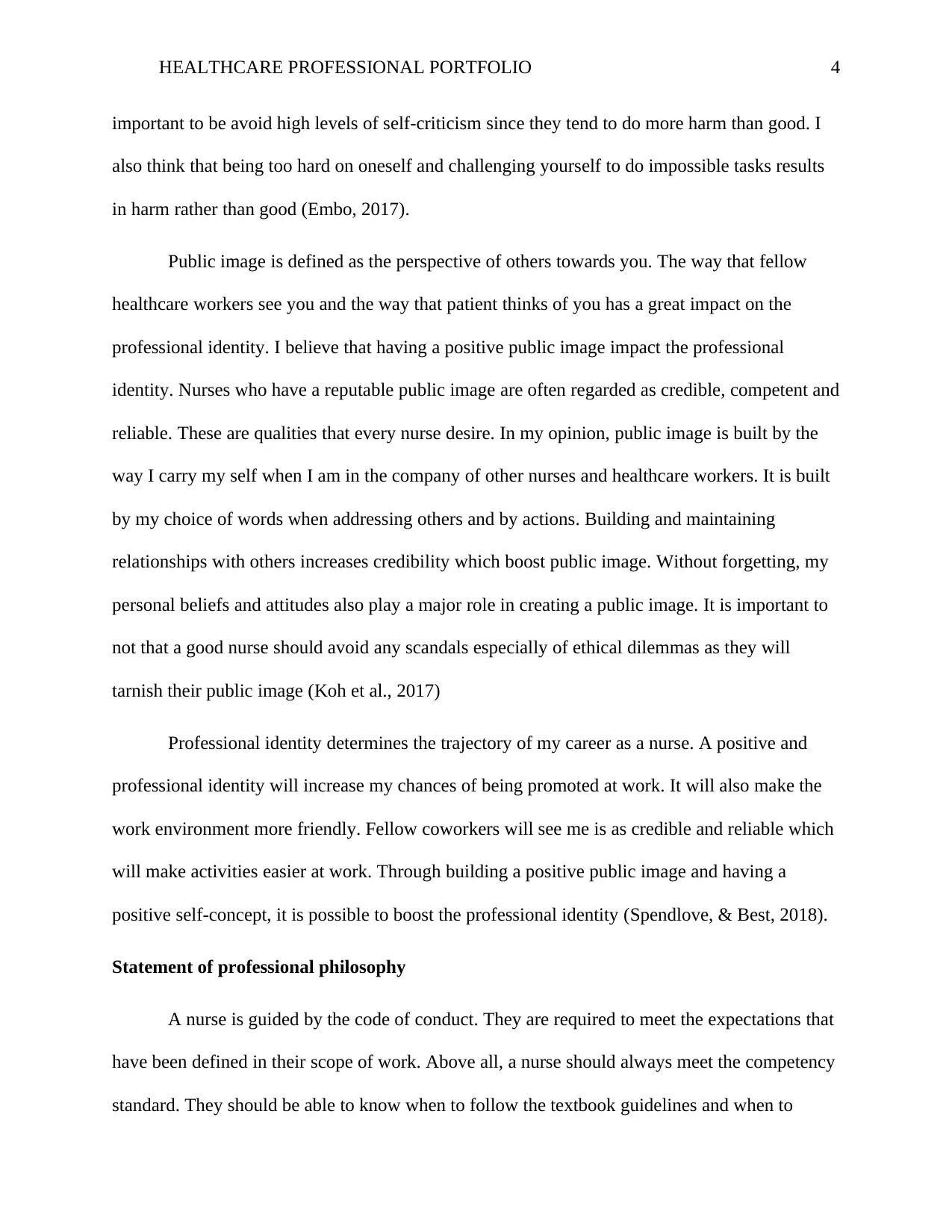
HEALTHCARE PROFESSIONAL PORTFOLIO 4
important to be avoid high levels of self-criticism since they tend to do more harm than good. I
also think that being too hard on oneself and challenging yourself to do impossible tasks results
in harm rather than good (Embo, 2017).
Public image is defined as the perspective of others towards you. The way that fellow
healthcare workers see you and the way that patient thinks of you has a great impact on the
professional identity. I believe that having a positive public image impact the professional
identity. Nurses who have a reputable public image are often regarded as credible, competent and
reliable. These are qualities that every nurse desire. In my opinion, public image is built by the
way I carry my self when I am in the company of other nurses and healthcare workers. It is built
by my choice of words when addressing others and by actions. Building and maintaining
relationships with others increases credibility which boost public image. Without forgetting, my
personal beliefs and attitudes also play a major role in creating a public image. It is important to
not that a good nurse should avoid any scandals especially of ethical dilemmas as they will
tarnish their public image (Koh et al., 2017)
Professional identity determines the trajectory of my career as a nurse. A positive and
professional identity will increase my chances of being promoted at work. It will also make the
work environment more friendly. Fellow coworkers will see me is as credible and reliable which
will make activities easier at work. Through building a positive public image and having a
positive self-concept, it is possible to boost the professional identity (Spendlove, & Best, 2018).
Statement of professional philosophy
A nurse is guided by the code of conduct. They are required to meet the expectations that
have been defined in their scope of work. Above all, a nurse should always meet the competency
standard. They should be able to know when to follow the textbook guidelines and when to
important to be avoid high levels of self-criticism since they tend to do more harm than good. I
also think that being too hard on oneself and challenging yourself to do impossible tasks results
in harm rather than good (Embo, 2017).
Public image is defined as the perspective of others towards you. The way that fellow
healthcare workers see you and the way that patient thinks of you has a great impact on the
professional identity. I believe that having a positive public image impact the professional
identity. Nurses who have a reputable public image are often regarded as credible, competent and
reliable. These are qualities that every nurse desire. In my opinion, public image is built by the
way I carry my self when I am in the company of other nurses and healthcare workers. It is built
by my choice of words when addressing others and by actions. Building and maintaining
relationships with others increases credibility which boost public image. Without forgetting, my
personal beliefs and attitudes also play a major role in creating a public image. It is important to
not that a good nurse should avoid any scandals especially of ethical dilemmas as they will
tarnish their public image (Koh et al., 2017)
Professional identity determines the trajectory of my career as a nurse. A positive and
professional identity will increase my chances of being promoted at work. It will also make the
work environment more friendly. Fellow coworkers will see me is as credible and reliable which
will make activities easier at work. Through building a positive public image and having a
positive self-concept, it is possible to boost the professional identity (Spendlove, & Best, 2018).
Statement of professional philosophy
A nurse is guided by the code of conduct. They are required to meet the expectations that
have been defined in their scope of work. Above all, a nurse should always meet the competency
standard. They should be able to know when to follow the textbook guidelines and when to
Paraphrase This Document
Need a fresh take? Get an instant paraphrase of this document with our AI Paraphraser
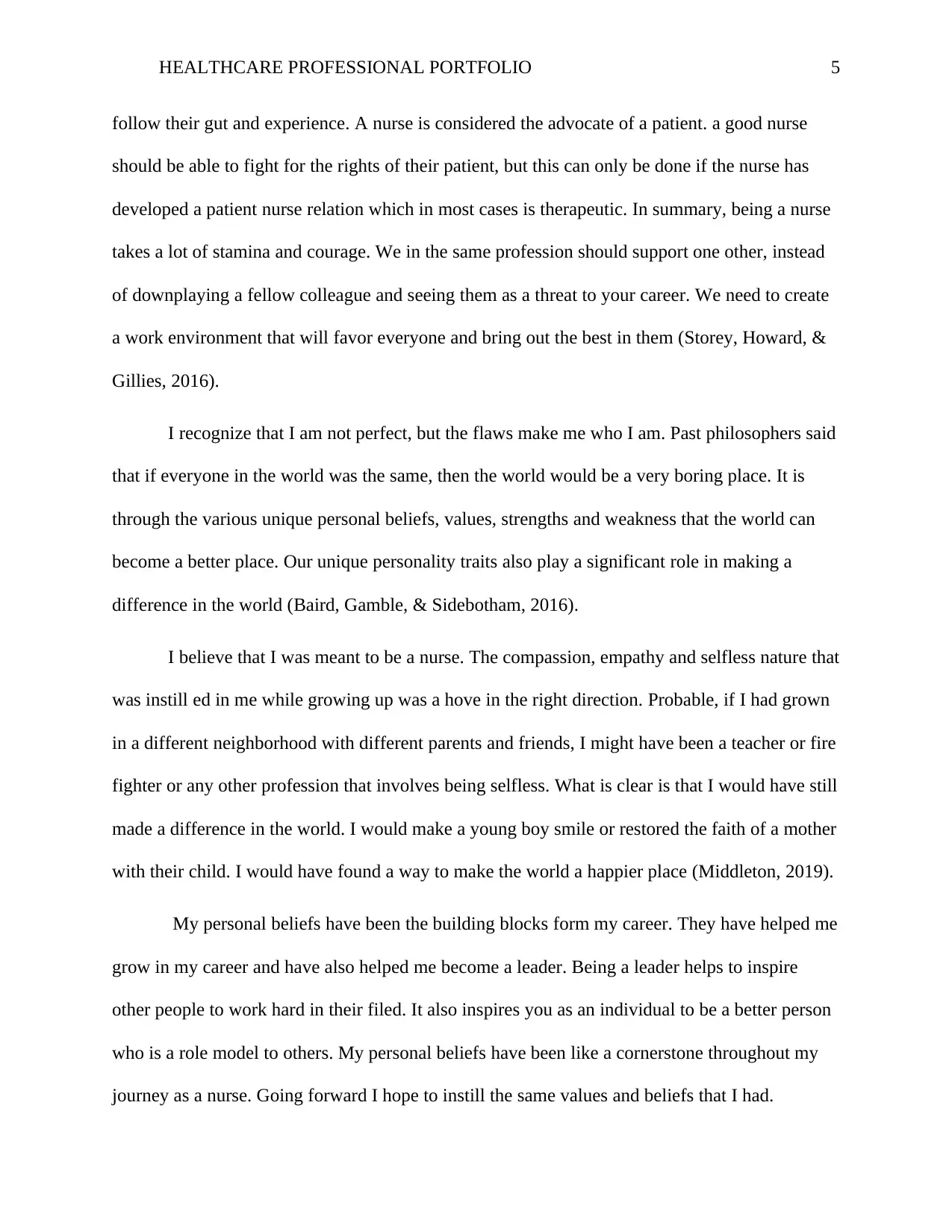
HEALTHCARE PROFESSIONAL PORTFOLIO 5
follow their gut and experience. A nurse is considered the advocate of a patient. a good nurse
should be able to fight for the rights of their patient, but this can only be done if the nurse has
developed a patient nurse relation which in most cases is therapeutic. In summary, being a nurse
takes a lot of stamina and courage. We in the same profession should support one other, instead
of downplaying a fellow colleague and seeing them as a threat to your career. We need to create
a work environment that will favor everyone and bring out the best in them (Storey, Howard, &
Gillies, 2016).
I recognize that I am not perfect, but the flaws make me who I am. Past philosophers said
that if everyone in the world was the same, then the world would be a very boring place. It is
through the various unique personal beliefs, values, strengths and weakness that the world can
become a better place. Our unique personality traits also play a significant role in making a
difference in the world (Baird, Gamble, & Sidebotham, 2016).
I believe that I was meant to be a nurse. The compassion, empathy and selfless nature that
was instill ed in me while growing up was a hove in the right direction. Probable, if I had grown
in a different neighborhood with different parents and friends, I might have been a teacher or fire
fighter or any other profession that involves being selfless. What is clear is that I would have still
made a difference in the world. I would make a young boy smile or restored the faith of a mother
with their child. I would have found a way to make the world a happier place (Middleton, 2019).
My personal beliefs have been the building blocks form my career. They have helped me
grow in my career and have also helped me become a leader. Being a leader helps to inspire
other people to work hard in their filed. It also inspires you as an individual to be a better person
who is a role model to others. My personal beliefs have been like a cornerstone throughout my
journey as a nurse. Going forward I hope to instill the same values and beliefs that I had.
follow their gut and experience. A nurse is considered the advocate of a patient. a good nurse
should be able to fight for the rights of their patient, but this can only be done if the nurse has
developed a patient nurse relation which in most cases is therapeutic. In summary, being a nurse
takes a lot of stamina and courage. We in the same profession should support one other, instead
of downplaying a fellow colleague and seeing them as a threat to your career. We need to create
a work environment that will favor everyone and bring out the best in them (Storey, Howard, &
Gillies, 2016).
I recognize that I am not perfect, but the flaws make me who I am. Past philosophers said
that if everyone in the world was the same, then the world would be a very boring place. It is
through the various unique personal beliefs, values, strengths and weakness that the world can
become a better place. Our unique personality traits also play a significant role in making a
difference in the world (Baird, Gamble, & Sidebotham, 2016).
I believe that I was meant to be a nurse. The compassion, empathy and selfless nature that
was instill ed in me while growing up was a hove in the right direction. Probable, if I had grown
in a different neighborhood with different parents and friends, I might have been a teacher or fire
fighter or any other profession that involves being selfless. What is clear is that I would have still
made a difference in the world. I would make a young boy smile or restored the faith of a mother
with their child. I would have found a way to make the world a happier place (Middleton, 2019).
My personal beliefs have been the building blocks form my career. They have helped me
grow in my career and have also helped me become a leader. Being a leader helps to inspire
other people to work hard in their filed. It also inspires you as an individual to be a better person
who is a role model to others. My personal beliefs have been like a cornerstone throughout my
journey as a nurse. Going forward I hope to instill the same values and beliefs that I had.
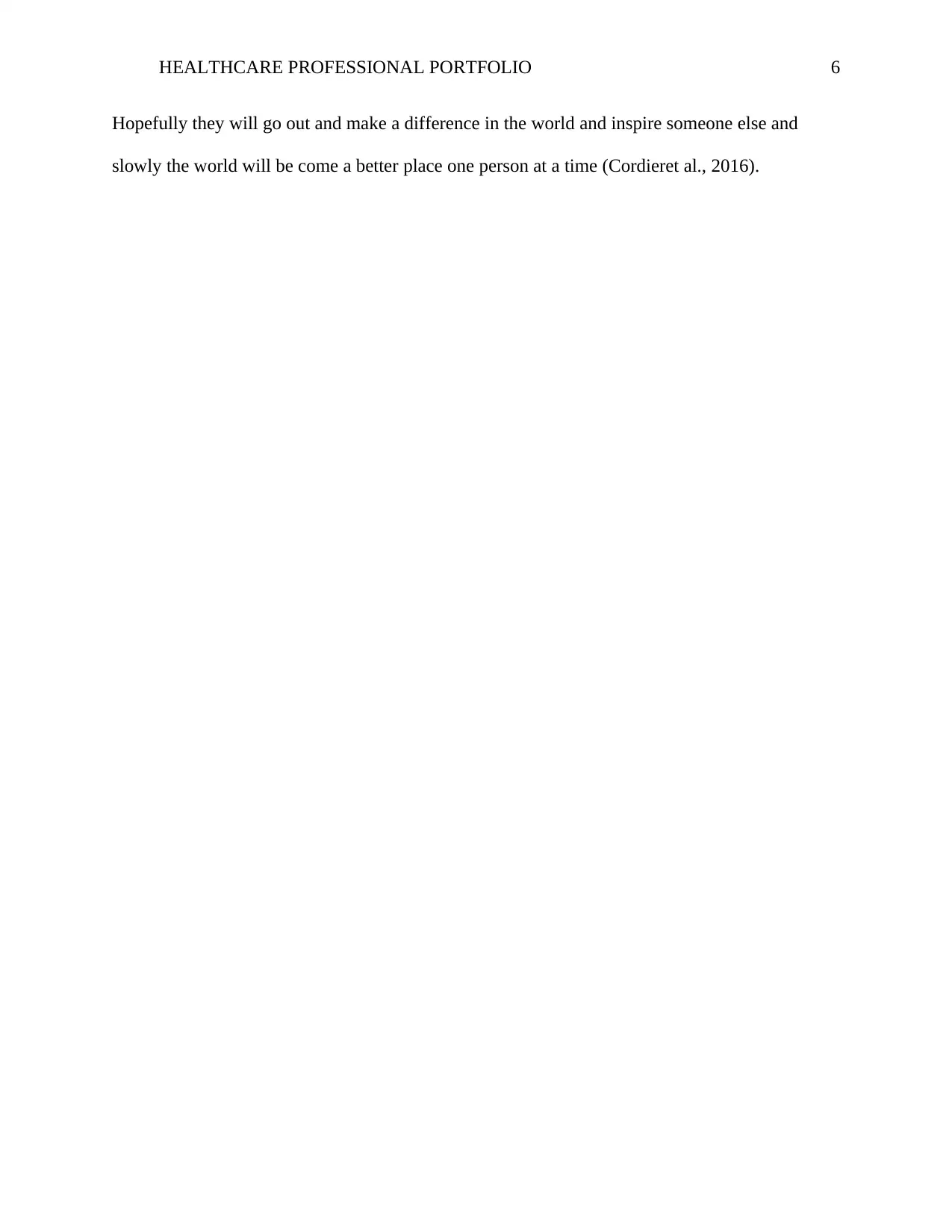
HEALTHCARE PROFESSIONAL PORTFOLIO 6
Hopefully they will go out and make a difference in the world and inspire someone else and
slowly the world will be come a better place one person at a time (Cordieret al., 2016).
Hopefully they will go out and make a difference in the world and inspire someone else and
slowly the world will be come a better place one person at a time (Cordieret al., 2016).
⊘ This is a preview!⊘
Do you want full access?
Subscribe today to unlock all pages.

Trusted by 1+ million students worldwide
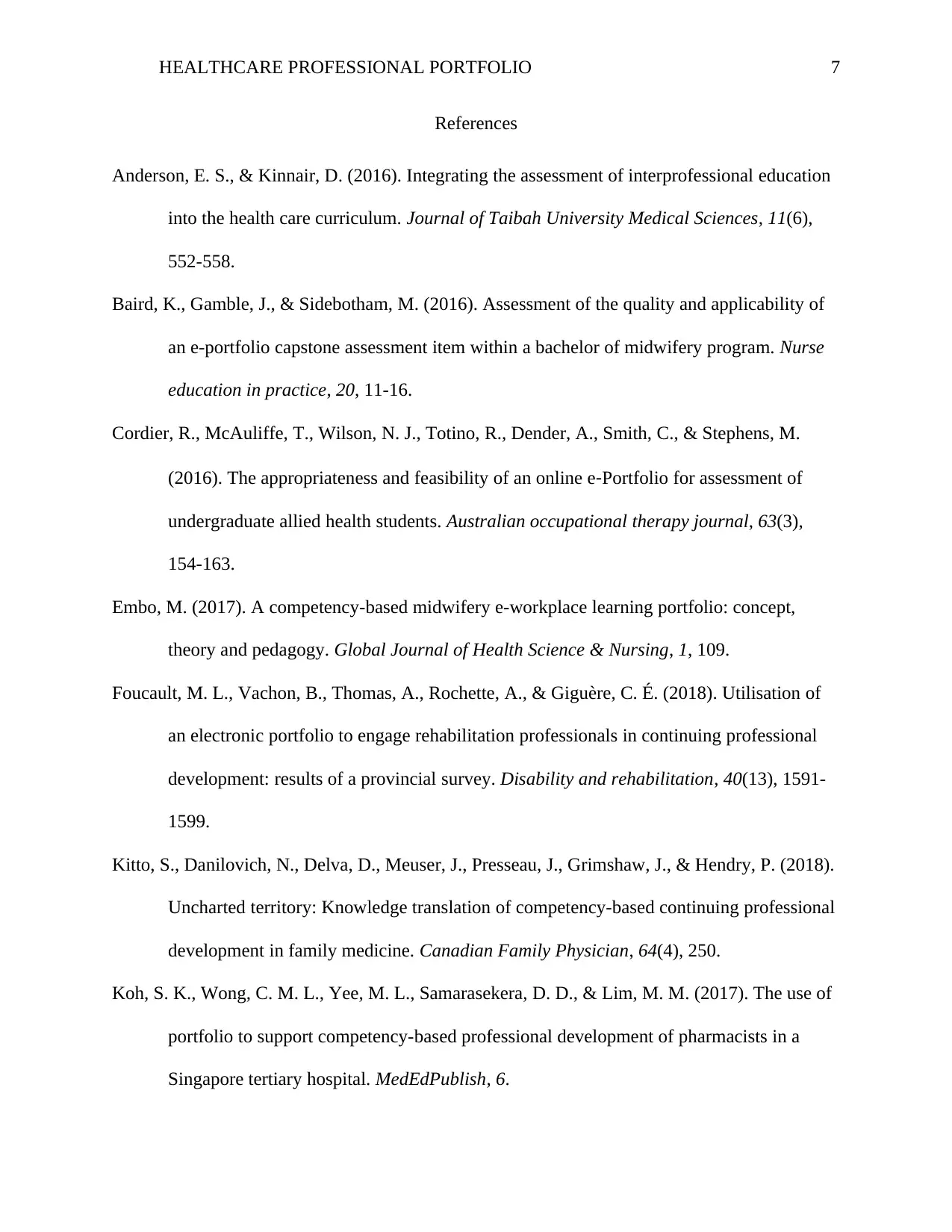
HEALTHCARE PROFESSIONAL PORTFOLIO 7
References
Anderson, E. S., & Kinnair, D. (2016). Integrating the assessment of interprofessional education
into the health care curriculum. Journal of Taibah University Medical Sciences, 11(6),
552-558.
Baird, K., Gamble, J., & Sidebotham, M. (2016). Assessment of the quality and applicability of
an e-portfolio capstone assessment item within a bachelor of midwifery program. Nurse
education in practice, 20, 11-16.
Cordier, R., McAuliffe, T., Wilson, N. J., Totino, R., Dender, A., Smith, C., & Stephens, M.
(2016). The appropriateness and feasibility of an online e‐Portfolio for assessment of
undergraduate allied health students. Australian occupational therapy journal, 63(3),
154-163.
Embo, M. (2017). A competency-based midwifery e-workplace learning portfolio: concept,
theory and pedagogy. Global Journal of Health Science & Nursing, 1, 109.
Foucault, M. L., Vachon, B., Thomas, A., Rochette, A., & Giguère, C. É. (2018). Utilisation of
an electronic portfolio to engage rehabilitation professionals in continuing professional
development: results of a provincial survey. Disability and rehabilitation, 40(13), 1591-
1599.
Kitto, S., Danilovich, N., Delva, D., Meuser, J., Presseau, J., Grimshaw, J., & Hendry, P. (2018).
Uncharted territory: Knowledge translation of competency-based continuing professional
development in family medicine. Canadian Family Physician, 64(4), 250.
Koh, S. K., Wong, C. M. L., Yee, M. L., Samarasekera, D. D., & Lim, M. M. (2017). The use of
portfolio to support competency-based professional development of pharmacists in a
Singapore tertiary hospital. MedEdPublish, 6.
References
Anderson, E. S., & Kinnair, D. (2016). Integrating the assessment of interprofessional education
into the health care curriculum. Journal of Taibah University Medical Sciences, 11(6),
552-558.
Baird, K., Gamble, J., & Sidebotham, M. (2016). Assessment of the quality and applicability of
an e-portfolio capstone assessment item within a bachelor of midwifery program. Nurse
education in practice, 20, 11-16.
Cordier, R., McAuliffe, T., Wilson, N. J., Totino, R., Dender, A., Smith, C., & Stephens, M.
(2016). The appropriateness and feasibility of an online e‐Portfolio for assessment of
undergraduate allied health students. Australian occupational therapy journal, 63(3),
154-163.
Embo, M. (2017). A competency-based midwifery e-workplace learning portfolio: concept,
theory and pedagogy. Global Journal of Health Science & Nursing, 1, 109.
Foucault, M. L., Vachon, B., Thomas, A., Rochette, A., & Giguère, C. É. (2018). Utilisation of
an electronic portfolio to engage rehabilitation professionals in continuing professional
development: results of a provincial survey. Disability and rehabilitation, 40(13), 1591-
1599.
Kitto, S., Danilovich, N., Delva, D., Meuser, J., Presseau, J., Grimshaw, J., & Hendry, P. (2018).
Uncharted territory: Knowledge translation of competency-based continuing professional
development in family medicine. Canadian Family Physician, 64(4), 250.
Koh, S. K., Wong, C. M. L., Yee, M. L., Samarasekera, D. D., & Lim, M. M. (2017). The use of
portfolio to support competency-based professional development of pharmacists in a
Singapore tertiary hospital. MedEdPublish, 6.
Paraphrase This Document
Need a fresh take? Get an instant paraphrase of this document with our AI Paraphraser
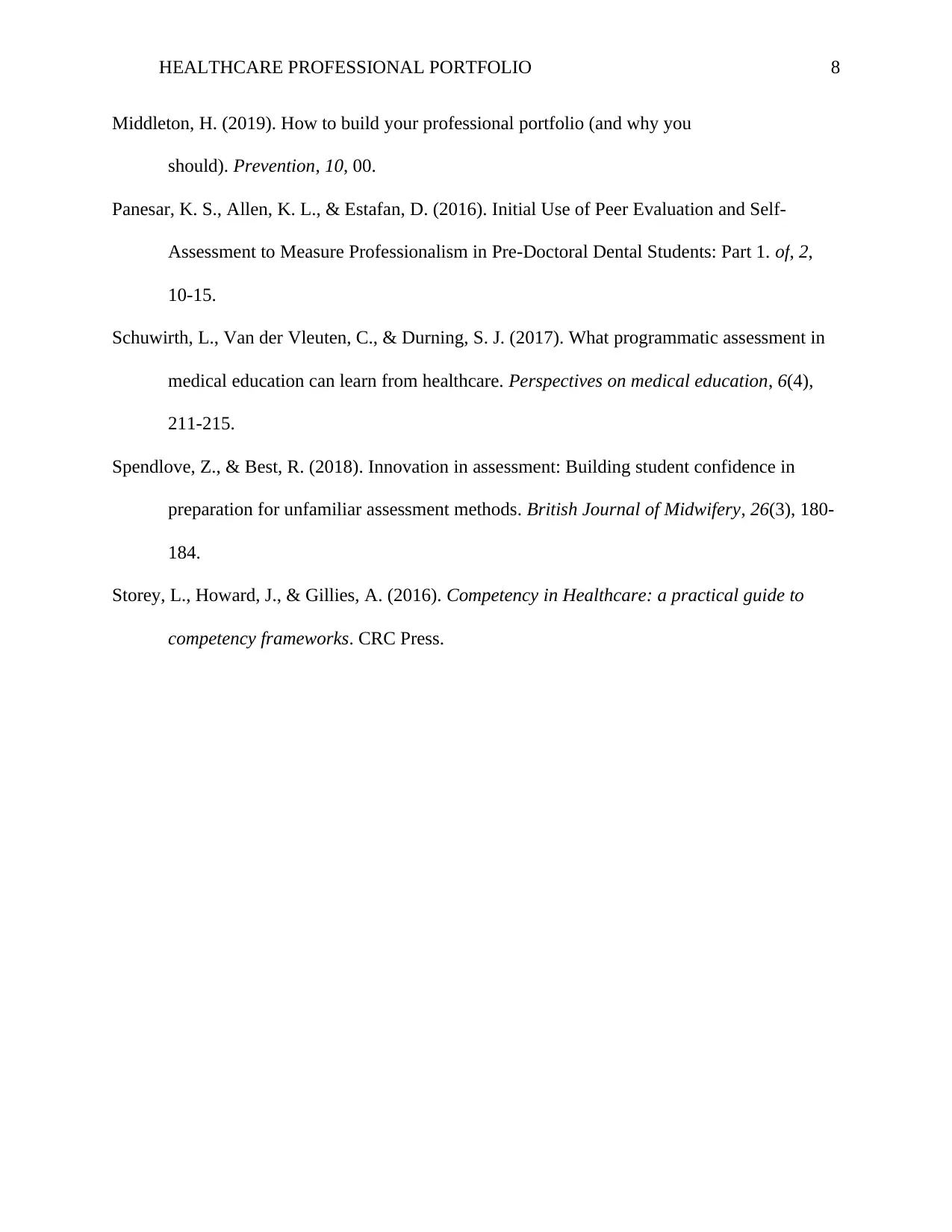
HEALTHCARE PROFESSIONAL PORTFOLIO 8
Middleton, H. (2019). How to build your professional portfolio (and why you
should). Prevention, 10, 00.
Panesar, K. S., Allen, K. L., & Estafan, D. (2016). Initial Use of Peer Evaluation and Self-
Assessment to Measure Professionalism in Pre-Doctoral Dental Students: Part 1. of, 2,
10-15.
Schuwirth, L., Van der Vleuten, C., & Durning, S. J. (2017). What programmatic assessment in
medical education can learn from healthcare. Perspectives on medical education, 6(4),
211-215.
Spendlove, Z., & Best, R. (2018). Innovation in assessment: Building student confidence in
preparation for unfamiliar assessment methods. British Journal of Midwifery, 26(3), 180-
184.
Storey, L., Howard, J., & Gillies, A. (2016). Competency in Healthcare: a practical guide to
competency frameworks. CRC Press.
Middleton, H. (2019). How to build your professional portfolio (and why you
should). Prevention, 10, 00.
Panesar, K. S., Allen, K. L., & Estafan, D. (2016). Initial Use of Peer Evaluation and Self-
Assessment to Measure Professionalism in Pre-Doctoral Dental Students: Part 1. of, 2,
10-15.
Schuwirth, L., Van der Vleuten, C., & Durning, S. J. (2017). What programmatic assessment in
medical education can learn from healthcare. Perspectives on medical education, 6(4),
211-215.
Spendlove, Z., & Best, R. (2018). Innovation in assessment: Building student confidence in
preparation for unfamiliar assessment methods. British Journal of Midwifery, 26(3), 180-
184.
Storey, L., Howard, J., & Gillies, A. (2016). Competency in Healthcare: a practical guide to
competency frameworks. CRC Press.
1 out of 8
Related Documents
Your All-in-One AI-Powered Toolkit for Academic Success.
+13062052269
info@desklib.com
Available 24*7 on WhatsApp / Email
![[object Object]](/_next/static/media/star-bottom.7253800d.svg)
Unlock your academic potential
Copyright © 2020–2026 A2Z Services. All Rights Reserved. Developed and managed by ZUCOL.

![Personal Statement: Adult Nursing Application - University of [Name]](/_next/image/?url=https%3A%2F%2Fdesklib.com%2Fmedia%2Fimages%2Ffc%2F10e7282a88ab4b1dadb62e04a9338668.jpg&w=256&q=75)



